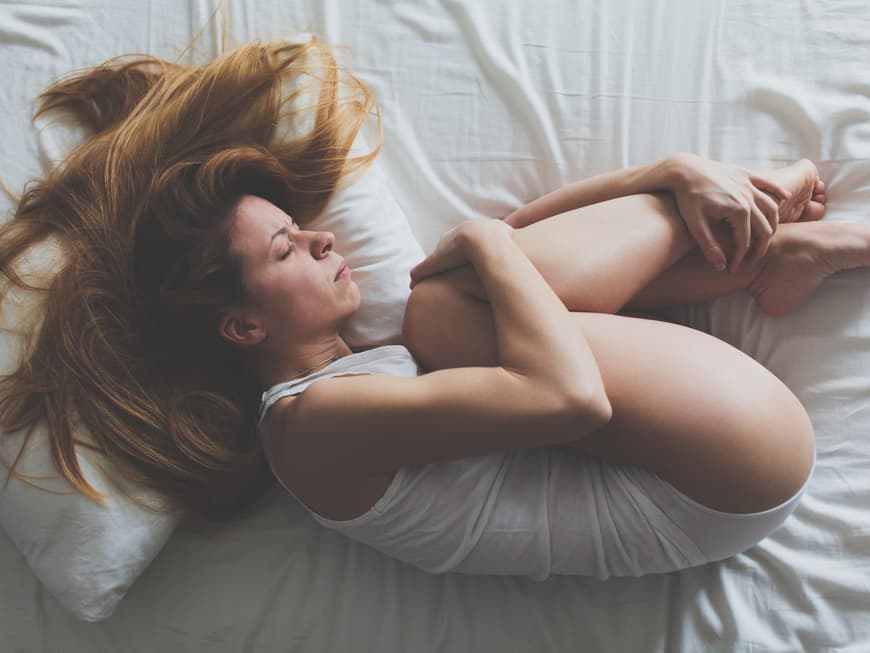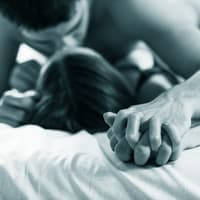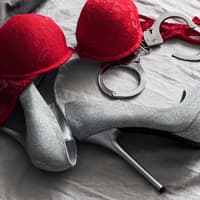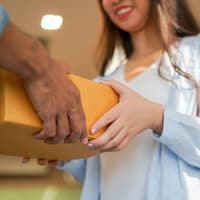
- For some, this is the time around the end of the month when there is so much to do in the office. Then they are stressed.
- For others, it's the moment when there's no more money in the account. Then they are full of worries. That also takes away the desire.
- And for some women, it's the time of menstruation. This is when the period is associated with pain. Because pain is also not very pleasurable.
Now, sex can also relax us and an orgasm can loosen tense muscles. But sometimes it just hurts and we want to snuggle up under the comforter and forget about the world around us. It's particularly annoying when someone tells us not to be such a pain, it can't be that bad. Yes, it can be. We are all different in the way we feel pain.
Period pain is even a medical phenomenon and goes by the unpronounceable name of dysmenorrhea. But what is behind it when women suffer like this once a month?
Why do we actually need menstruation?
There are numerous myths surrounding menstruation:
- Women were said to be impure during this time in the past and in some places this is still the case today.
- Women spoil fresh milk and can't whip cream. Have you ever tried it? And what happened? Nothing, of course. The cream stands.
- Incidentally, menstruating women can't harm minced meat either.
- And period blood is not poisonous either!
- Women can also do lots of sport during this time. When swimming, however, they should make sure that the blood does not get into the pool.
So there is nothing to the prejudices. Nevertheless, some women would like to give up their period for very practical reasons. And some manage to do so by tricking nature with hormonal contraceptives. Others lose their uterus prematurely.
And at some point, we all go through the menopause. This in turn knocks many a woman off her feet. No menstruation, no fertility. However, many women associate their femininity and their womanhood with the possibility of having children. Whether it is an acute desire or not, it is simply about the possibility. And for that we need menstruation. After all, it is part of the monthly cycle that revolves around the egg and fertilization. Again and again, month after month, year after year.
Where does the pain come from?
The start of the cycle is the first day of menstruation. Day one. This makes sense, because it cannot be overlooked or ignored. This is also the day on which we start taking the first pill.
The mucous membrane built up in the last cycle is shed by the uterus and rebuilt in the new cycle. If the egg had been fertilized, it would have implanted here. But it obviously did not. That's why millions of women breathe a sigh of relief on this first day. Not pregnant, lucky. For others, however, it is a very sad day. Not pregnant, what a shame. One man's joy, another man's sorrow.
The shedding of the uninhabited mucous membrane now leads to pain.
- The uterine muscles tense up and push out all that is now superfluous.
- This can also affect the bowel. Some women even feel the discomfort here first.
- Some of you may also be familiar with nausea, headaches and back pain.
It may be that these pains occur from the first menstrual period onwards. If so, they are part of your life and will probably remain with you until the menopause. However, there are no particular illnesses behind them. Nevertheless.
Period pains as a sign of an illness
It can be different if the problems only occur later. In this case, you should definitely talk to your doctor about it. Many women develop fibroids over time. These are benign tumors on the uterine wall. They don't do anything until they get too big. Then they can cause discomfort during sex and also during your period. The same applies to polyps, which can also develop. In this case, women who want to become pregnant should consult their doctor.
Cancerous tumors on the cervix or ovaries, on the other hand, definitely require treatment. Unfortunately, they are sometimes only recognized when they cause these symptoms. A disease that frequently occurs in this context is endometriosis. In this case, the lining of the uterus is located in the abdominal cavity and causes the cyclical symptoms. And then there are vaginal infections with chronic inflammation of the fallopian tubes. So, if the pain suddenly occurs, off to the doctor's office!
What helps with the pain?
- Painkillers. Antispasmodics are best. You won't be taking these permanently, but only for one or two days a month. Ask your doctor's surgery or pharmacy for advice on which preparation is best for you.
- Hormone preparations such as the pill offer a permanent solution.
- Some women complain of problems in connection with the IUD. In this case, it would be worth considering switching to a better-tolerated product. Mini IUDs or the copper chain are now available.
But it is also possible without medicine:
- A hot water bottle relaxes and at the same time gives you a cozy, warm feeling.
- Perhaps something quiet like yoga or a long walk will help you. Exercise will do you good and cheer you up at the same time.
- Acupuncture and acupressure are also recommended. You can do the latter yourself by placing a hand below your navel and applying pressure. This relaxes the muscles.
And an orgasm helps really well! It relaxes both the pelvic floor muscles and your psyche, whether alone or as a couple. And you can also take things slowly. Pleasure is therefore an effective antidote to period pain.
Anja Drews - qualified sex educator for ORION






